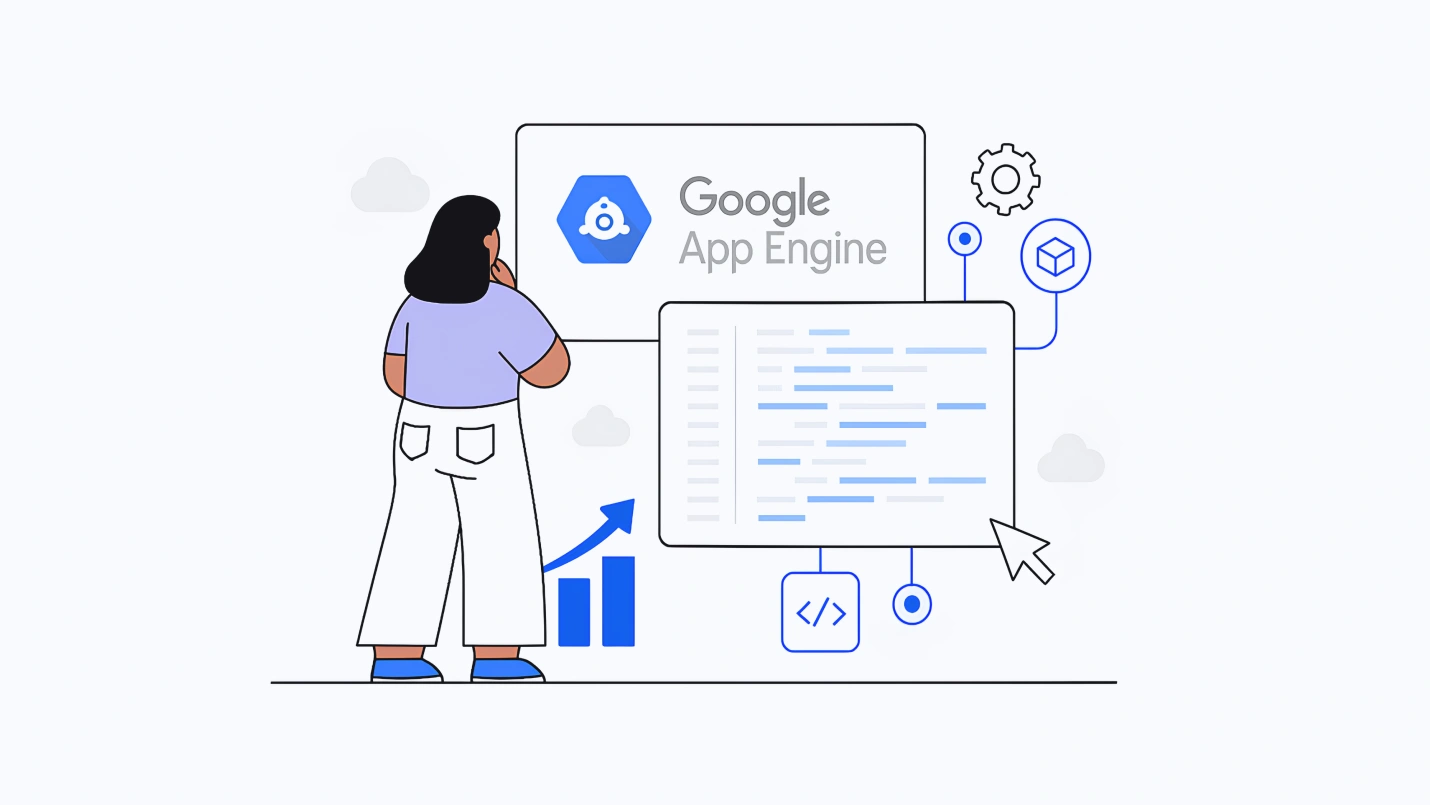Summary: In the present-day digitalized environment, cloud computing services have accelerated business growth and offered diverse benefits like accessibility, security, scalability, and more. Service platforms play an essential role because of the sensitivity of data transmissions and the data volume. Google App Engine or GAE is one of the top choices for this – it enables the building & hosting of web applications on a fully-managed serverless platform. Are you curious to know more about this service that has facilitated hassle-free creating & hosting of applications? Let’s get started:
What is Google App Engine?
Google App Engine (GAE) is a service, a scalable environment, and a cloud computing technology that Google provides for building and hosting applications. It provides both a secure execution environment and a collection of services that simplify the development of scalable and high-performance Web applications.
GAE takes advantage of Google’s vast & efficient computing infrastructure to scale dynamically with changing demands over time. “Effortless” comes to mind when we talk of GAE as it frees developers from managing infrastructure and provides effortless development of applications.
Google Cloud Market Share via Kinsta:-
- As of Q4 2021, the Google Cloud market share is 9% worldwide
- The global cloud market was valued at $70.19 billion in 2021.
- That number is expected to grow to $83.41 billion in 2022.
- By 2029, the cloud market industry could be worth $376.37 billion.
Google App Engine’s market share is 10.71%, with more than 16506 companies using it.(Datanyze.com)
As a Google Cloud Platform service, it helps:
Build highly scalable applications on a fully managed serverless platform.
– Google Cloud
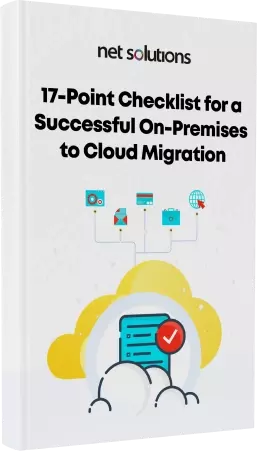
We respect your privacy. Your information is safe.
The App Engine architecture
The App Engine architecture in cloud computing looks like this:
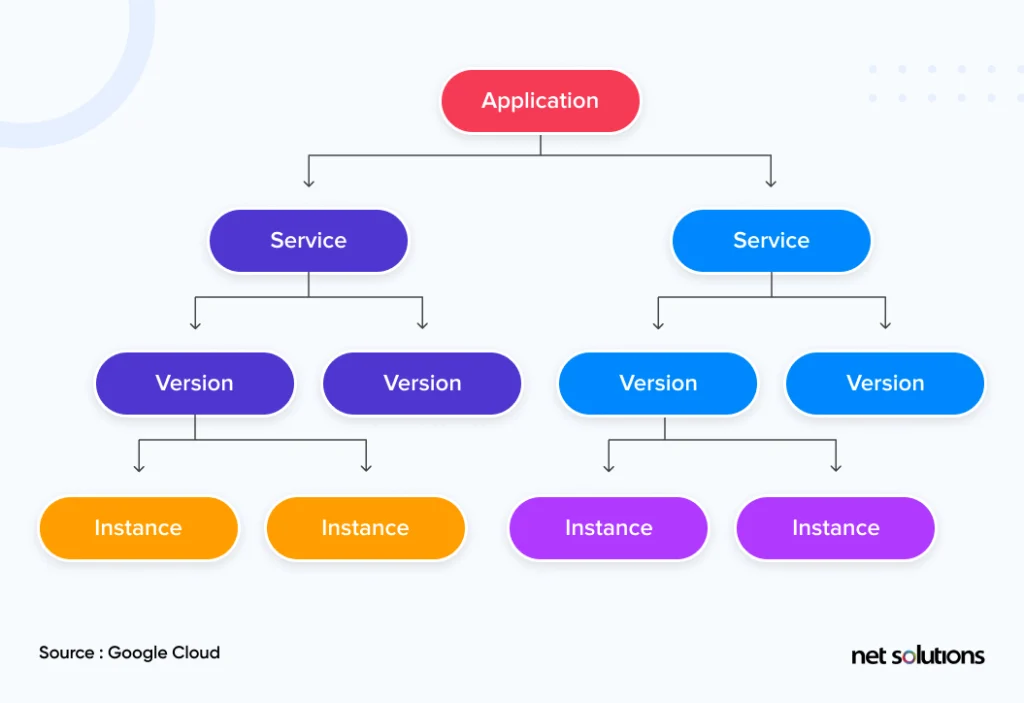
Services provided by App Engine include:
- Platform as a Service (PaaS) to build and deploy scalable applications
- Hosting facility in fully-managed data centers
- A fully-managed, flexible environment platform for managing application server and infrastructure
- Support in the form of popular development languages and developer tools
Here’s how Gartner rates Google App Engine:
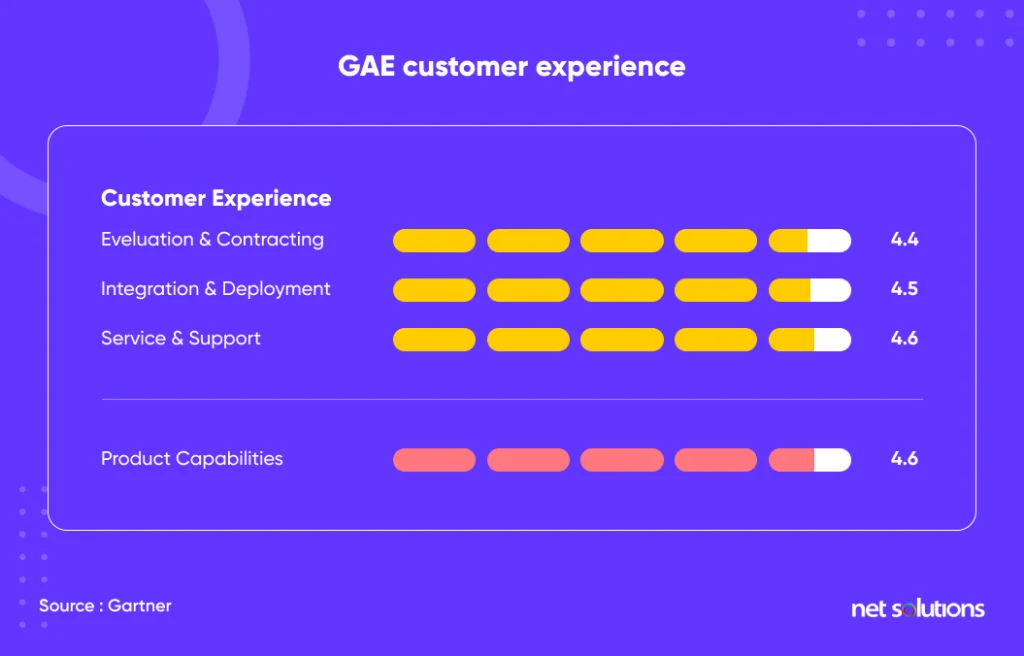
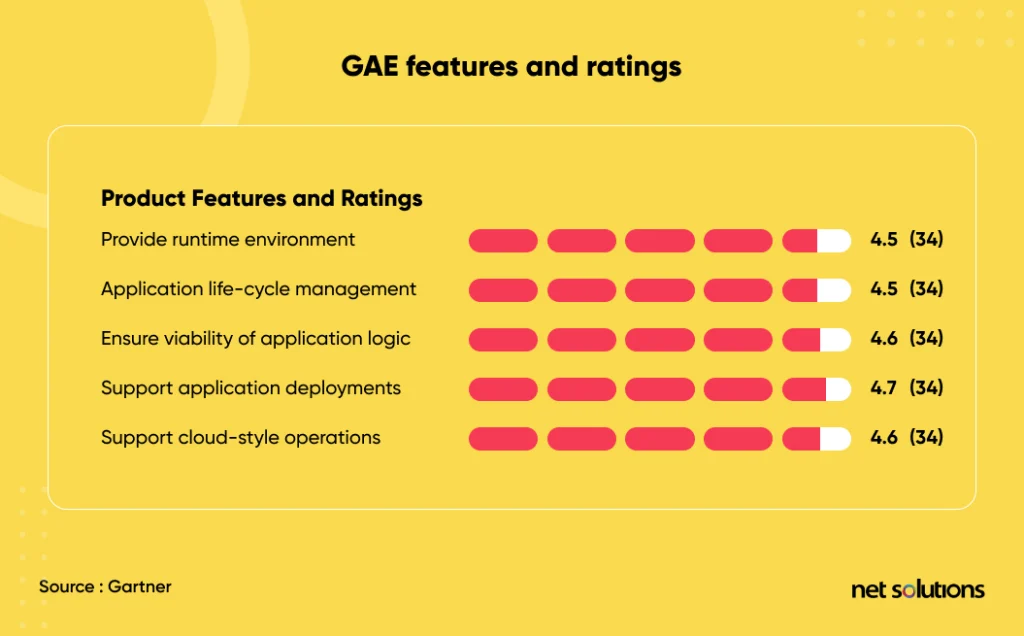
Is Google App Engine PaaS or SaaS?
Google App Engine in cloud computing is a PaaS, Platform as a Service model, i.e., it provides a platform for developers to build and deploy scalable applications on the Google cloud platform. GAE excels in managing the built applications in Google’s data centers.
Organizations are then left free to focus on building applications on the cloud, and they do not have to worry about hosting and managing the application infrastructure. GAE is, therefore, a preferable choice for organizations as it streamlines workflows and lays the foundation for efficient processes. It helps ensure faster time to market, lets you focus on core business capabilities, and efficiently manages the consecutive release cycle.
Major Features of Google App Engine in Cloud Computing
These prominent features enable GAE to be a hassle-free service platform.
1. Collection of Development Languages and Tools
The App Engine supports numerous programming languages for developers and offers the flexibility to import libraries and frameworks through docker containers. You can develop and test an app locally using the SDK tools for deploying apps. Every language has its SDK and runtime.
Some of the languages offered include — Python, PHP, .NET, Java, Ruby, C#, Go, and NodeJs.
2. Fully Managed
Google allows you to add your web application code to the platform while managing the infrastructure for you. The engine ensures that your web apps are secure and running and saves them from malware and threats by enabling the firewall.
3. Pay-as-you-Go
The app engine works on a pay-as-you-go model, i.e., you only pay for what you use. The app engine automatically scales up resources when the application traffic picks up and vice-versa.
4. Effective Diagnostic & Security Services
Cloud Monitoring and Cloud Logging help run app scans to identify bugs. Further, app reporting documents help developers fix bugs on an immediate basis. GAE also sets up rules for access, SSL certificates on custom domains, and TSL certificates without any extra charge to create user firewall systems.
5. Traffic Splitting
The app engine automatically routes the incoming traffic to different versions of the apps as a part of A/B testing. You can plan the consecutive increments based on the app’s best version.
What are the Benefits of Google App Engine?
Adopting the App Engine is a smart decision for your organization — It extends the benefits of cloud computing to application development & hosting. GAE allows businesses to innovate and stay focused on their core functions. Here’s why it is preferred as an app-building platform:

1. All-Time Availability
When you develop and deploy your web applications on the cloud, you enable remote access for your applications. Considering the impact of COVID-19 on businesses, Google App Engine is the right choice that lets the developers develop applications remotely while the cloud service manages the infrastructure needs.
2. Ensure Faster Time to Market
For your web applications to succeed, ensuring faster time to market is imperative as the requirements will likely change if the launch time is extended. Using Google App Engine is as easy as it can get for developers. The diverse tool repository and other functionalities reduce the Google Cloud application development and testing time, ensuring a faster launch time for Minimum Viable Product (MVP) and consecutive launches.
3. Easy to Use Platform
The developers are only required to write code. You eliminate all the burdens of managing and deploying the code with zero configuration and server management. Google App Engine makes it easy to use the platform, which offers the flexibility to focus on other concurrent web applications and processes. The best part is that GAE automatically handles the traffic increase through patching, provisioning, and monitoring.
4. Diverse Set of APIs
Google App Engine has several built-in APIs and services that allow developers to build robust and feature-rich apps. These features include-
- Access to the application log
- Blobstore, serve large data objects
- Google App Engine Cloud Storage
- SSL Support
- Page Speed Services
- Google Cloud Endpoint, for mobile application
- URL, Fetch API, User API, Memcache API, Channel API, XXMP API, File API
5. Increased Scalability
Scalability is synonymous with growth — an essential factor that assures success and competitive advantage. The good news is that the Google App Engine cloud development platform is automatically scalable. Whenever the traffic to the web application increases, GAE automatically scales up the resources and vice-versa.
6. Improved Savings
With Google App Engine, you do not have to spend extra on server management of the app. The Google Cloud service is good at handling the backend process. Also, Google App Engine pricing is flexible as the resources can scale up/down based on the app’s usage. The resources automatically scale up/down based on how the app performs in the market, thus ensuring honest pricing.
7. Smart Pricing
The major concern of organizations revolves around how much does Google App Engine cost? For your convenience, Google App Engine has a daily and a monthly billing cycle, i.e.,
- Daily: You will be charged daily for the resources you use
- Monthly: All the daily charges are calculated and added to the taxes (if applicable) and debited from your payment method
Also, the App Engine has a dedicated billing dashboard, “App Engine Dashboard” to view and manage your account and subsequent billings.
To sum it all here’s an introductory video on App Engine by Google Cloud Platform:
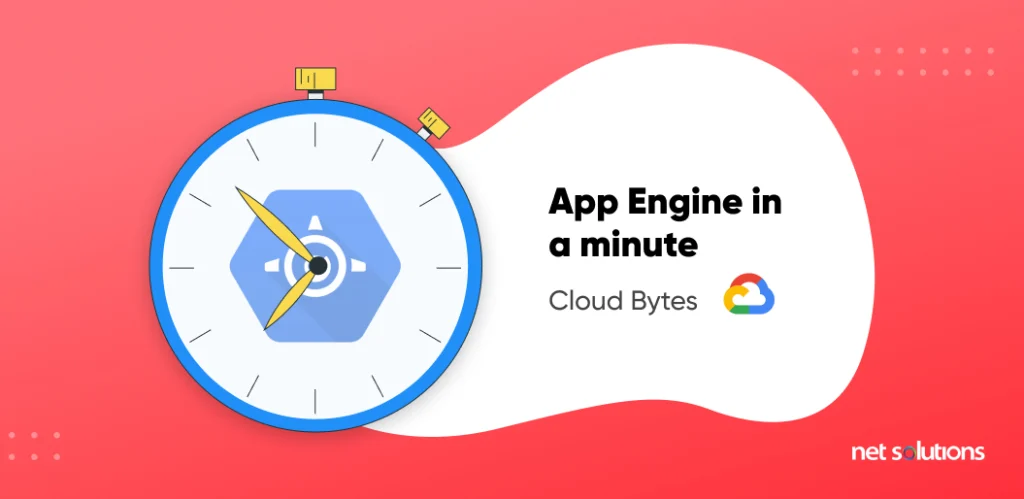
How does Google App Engine benefit your Business?
Google App Engine boosts businesses with the following advantages:
- Security norms for protecting sensitive data
- Expansive & Quicker Market reach with increased efficiency in app development & maintenance
- Easy Management backed by the consolidation of tools by GAE
- Market responsiveness with the ease of scalability that Google App Engine provides
- Efficient iterations by developers as per demand & requirements of users
- Smooth transitions to other environments since there aren’t too many dependencies
What are the challenges that GAE presents?
Even with all the cloud computing benefits that Google App Engine ushers in, there are a few implementation challenges.
1. Control
What does a user do if there is a problem related to the infrastructure? Wait for Google to solve it? Unfortunately, Back-end infrastructural setup, along with its advantages, also brings in a limitation of problem-solving.
2. Customer Support
This is one aspect that has been under scrutiny. Users are known to have been dissatisfied with the customer support facilities.
3. Porting
The porting of applications faces limitations because of potential vendor lock-in issues. Users often face issues with data migration to other NoSQL databases.
4. Limitations of access & performance
Several times, developers have access to the Google App Engine file system only in a limited read-only manner, creating issues. Writing to local files is a hurdle many times. Moreover, performance is affected because one physical server could be playing host to many separate and unrelated app engine users.
5. Expense
Some users have an issue that GAE can be costlier than self-hosted environments.
Top 10 Google App Engine Alternatives & Comparisons
Most people seek time-saving, efficient software solutions with hassle-free app development & deployment. They want easy-to-use and reliable platforms. The following have come across as alternatives to GAE within the gamut of cloud platforms as services.
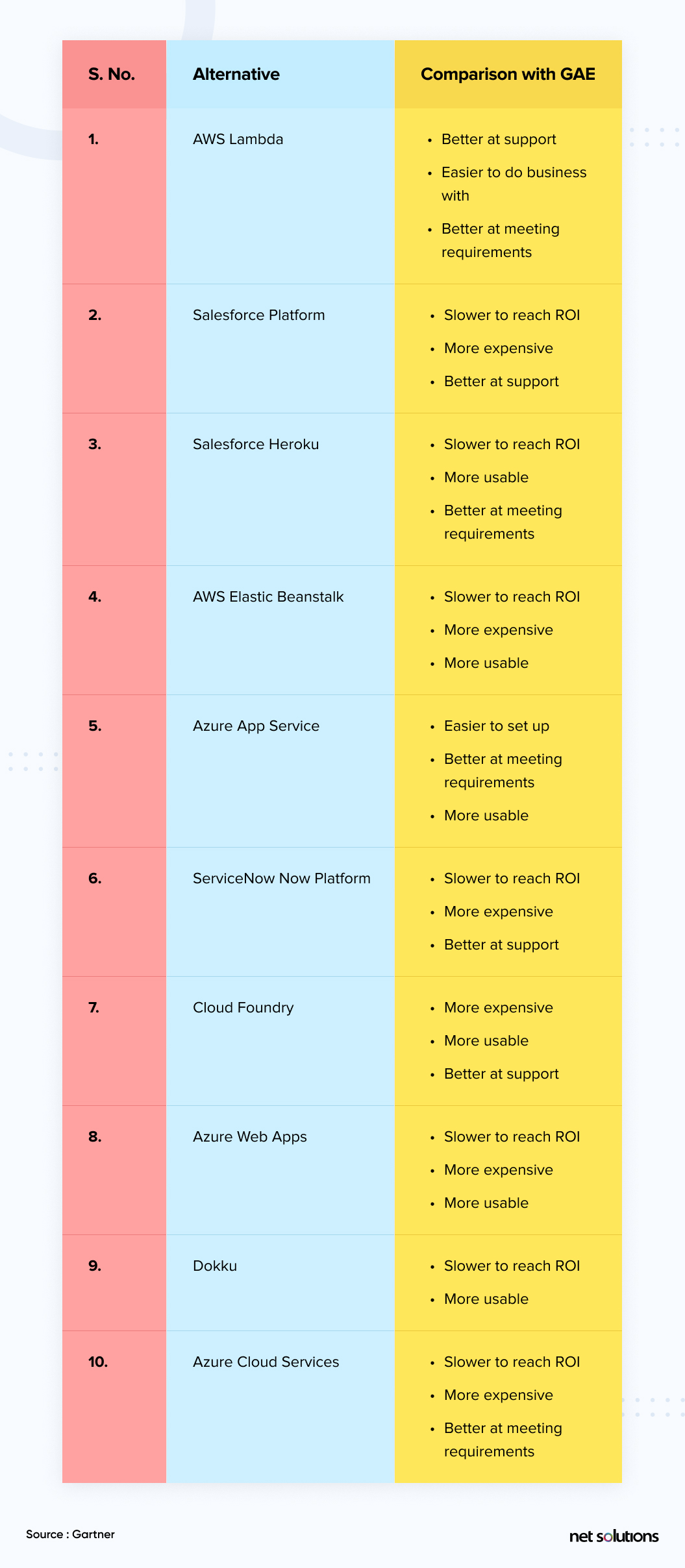
Frequently Asked Questions
Users opt for Google App Engine when they want to avoid setting up servers or want hassle-free scalability, or when they want pricing as per their actual usage and not time-slot-based. Situations of erratic traffic could call for using GAE too. Google App Engine lends many automation features and is, therefore, more popular with larger enterprises.
GAE offers a usage-based plan to its users. There is also a Free Quota plan for a trial version that works to give a limited number of resources for applications. The Paid Plan works to bill the users for the product they use for the time frame that they use it. Two pricing models cater to users’ needs – a Standard environment and a Flexible Environment. For more, you could also refer to the App Engine Pricing Page.

